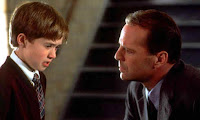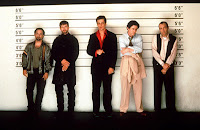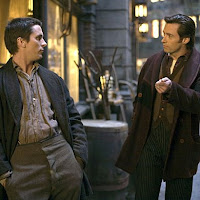Before you keep on reading this list of movies with surprise ending, be aware that there could be some spoilers, because it's hard to write this kind of article without spoiling any story out of the movie.
Frankly, i quoted(ideas) some of the writing in this article from all over the web, i try to bring the best list and easy to consume article so that you don't have to be a brainer to understand even the hardest twisting plot story of a movie.
So here goes:
This movie delivers a sucker punch to the audience and then pulls the rug out from under it. It is sensational.
The Sixth Sense (1999) - Bruce Willis
 The movie was pretty decent but didn’t have much of a plot, and I was wondering where the movie was going to go. And then – bam! Bruce Willis has been dead the whole time. Not only is it an amazingly good twist ending, but it also saves the movie from being just a decent ghost story.
The movie was pretty decent but didn’t have much of a plot, and I was wondering where the movie was going to go. And then – bam! Bruce Willis has been dead the whole time. Not only is it an amazingly good twist ending, but it also saves the movie from being just a decent ghost story.
Oldboy (2003)

The film starts out with a guy waking up in a suitcase on a rooftop after years of mysterious captivity. As he seeks out the truth, he teams up and falls in love with a younger woman. He has sex with her. Then, as we learn, he’s been hypnotized to fall in love with his own daughter – and thus he has unwillingly had sex with her. A second twist comes when the guy decides to erase his memories so he can continue to love and have sex with his daughter.
Primal Fear (1996) - Richard Gere, Edward Norton, Laura Linney
The movie is extremely good and offers a first glimpse at the exceptional acting talent stored within Edward Norton.
Aaron (Norton), this sweet and innocent young boy has been accused of killing his priest. Richard Gere plays his lawyer, and Laura Linney is the lawyer prosecuting him. As the trial unfolds a seemingly open and close case becomes very complicated and things become unveiled about Aaron that no one would have anticipated.
The Usual Suspects (1995) - Kevin Spacey, Gabriel Byrne, Stephen Baldwin

A terrific cast of exciting actors socks over this absorbingly complicated yarn that's been spun in seductively slick fashion by director Bryan Singer.
 Early on the films final explanation was easily cast aside, and in fact almost flaunted in plain sight, which makes it all the more delicious to go back and watch again. Even though the wool is clearly pulled over your eyes, it is an epic tale of fact, fiction, and illusion.
Early on the films final explanation was easily cast aside, and in fact almost flaunted in plain sight, which makes it all the more delicious to go back and watch again. Even though the wool is clearly pulled over your eyes, it is an epic tale of fact, fiction, and illusion.
Memento (2001) - Val Kilmer The plot makes one hundred different twists and turns that would have been shocking if even told in it’s actual chronological order, but the bewilderment of Lenny and the fact that he forgets what’s transpired the next day, though the viewer always remembers, is absolutely genius in it’s construction. The way Lenny, when confronted with certain horrific truths, manipulates and uses his own disorder to bring vengeance and order against those that have used and betrayed him is brilliant.
The plot makes one hundred different twists and turns that would have been shocking if even told in it’s actual chronological order, but the bewilderment of Lenny and the fact that he forgets what’s transpired the next day, though the viewer always remembers, is absolutely genius in it’s construction. The way Lenny, when confronted with certain horrific truths, manipulates and uses his own disorder to bring vengeance and order against those that have used and betrayed him is brilliant.
The Illusionist (2006) - Edward Norton, Paul Giamatti, Jessica Biel

This was a really good movie, by the end of the movie, the canniest viewers may not be fooled, but, and you can believe this, they may be mesmerized.
So here goes:
This movie delivers a sucker punch to the audience and then pulls the rug out from under it. It is sensational.
The Sixth Sense (1999) - Bruce Willis
 The movie was pretty decent but didn’t have much of a plot, and I was wondering where the movie was going to go. And then – bam! Bruce Willis has been dead the whole time. Not only is it an amazingly good twist ending, but it also saves the movie from being just a decent ghost story.
The movie was pretty decent but didn’t have much of a plot, and I was wondering where the movie was going to go. And then – bam! Bruce Willis has been dead the whole time. Not only is it an amazingly good twist ending, but it also saves the movie from being just a decent ghost story.Oldboy (2003)

The film starts out with a guy waking up in a suitcase on a rooftop after years of mysterious captivity. As he seeks out the truth, he teams up and falls in love with a younger woman. He has sex with her. Then, as we learn, he’s been hypnotized to fall in love with his own daughter – and thus he has unwillingly had sex with her. A second twist comes when the guy decides to erase his memories so he can continue to love and have sex with his daughter.
Primal Fear (1996) - Richard Gere, Edward Norton, Laura Linney
The movie is extremely good and offers a first glimpse at the exceptional acting talent stored within Edward Norton.
Aaron (Norton), this sweet and innocent young boy has been accused of killing his priest. Richard Gere plays his lawyer, and Laura Linney is the lawyer prosecuting him. As the trial unfolds a seemingly open and close case becomes very complicated and things become unveiled about Aaron that no one would have anticipated.
The Usual Suspects (1995) - Kevin Spacey, Gabriel Byrne, Stephen Baldwin

A terrific cast of exciting actors socks over this absorbingly complicated yarn that's been spun in seductively slick fashion by director Bryan Singer.
 Early on the films final explanation was easily cast aside, and in fact almost flaunted in plain sight, which makes it all the more delicious to go back and watch again. Even though the wool is clearly pulled over your eyes, it is an epic tale of fact, fiction, and illusion.
Early on the films final explanation was easily cast aside, and in fact almost flaunted in plain sight, which makes it all the more delicious to go back and watch again. Even though the wool is clearly pulled over your eyes, it is an epic tale of fact, fiction, and illusion.Spoiler Alert ! Angier may have found the scientific trick to cloning when all along all Alfred did was live a double life with a twin brother living as one person with both a mistress and a wife that didn’t even know they were two people.
 The plot makes one hundred different twists and turns that would have been shocking if even told in it’s actual chronological order, but the bewilderment of Lenny and the fact that he forgets what’s transpired the next day, though the viewer always remembers, is absolutely genius in it’s construction. The way Lenny, when confronted with certain horrific truths, manipulates and uses his own disorder to bring vengeance and order against those that have used and betrayed him is brilliant.
The plot makes one hundred different twists and turns that would have been shocking if even told in it’s actual chronological order, but the bewilderment of Lenny and the fact that he forgets what’s transpired the next day, though the viewer always remembers, is absolutely genius in it’s construction. The way Lenny, when confronted with certain horrific truths, manipulates and uses his own disorder to bring vengeance and order against those that have used and betrayed him is brilliant.The Illusionist (2006) - Edward Norton, Paul Giamatti, Jessica Biel

This was a really good movie, by the end of the movie, the canniest viewers may not be fooled, but, and you can believe this, they may be mesmerized.
Maybe you guys have other movies in mind, please let me know by leaving a comment below, so that i can make a better list next time ^_^ that's a wrap for top best movies with surprise ending, ciao for now...











